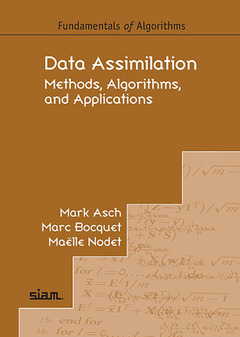Description
Data Assimilation
Methods, Algorithms, and Applications
Fundamentals of Algorithms Series
Authors: Asch Mark, Bocquet Marc, Nodet Maëlle
This guide provides a framework for and insight into the inverse problem nature of data assimilation, emphasised methods and diagnostics.
Language: English
Subjects for Data Assimilation:
103.91 €
In Print (Delivery period: 15 days).
Add to cart
Publication date: 02-2017
320 p. · 17.7x25.5 cm · Paperback
320 p. · 17.7x25.5 cm · Paperback
Description
/li>Contents
/li>Biography
/li>
Data assimilation is an approach that combines observations and model output, with the objective of improving the latter. This book places data assimilation into the broader context of inverse problems and the theory, methods, and algorithms that are used for their solution. It provides a framework for, and insight into, the inverse problem nature of data assimilation, emphasising 'why' and not just 'how'. Methods and diagnostics are emphasised, enabling readers to readily apply them to their own field of study. This comprehensive guide is accessible to non-experts and contains numerous examples and diverse applications from a broad range of domains, including geophysics, environmental acoustics, medical imaging, mechanical and biomedical engineering, economics and finance, and traffic control and urban planning. Readers will also find included the latest methods for advanced data assimilation, combining variational and statistical approaches.
List of figures; List of algorithms; Notation; Preface; Part I. Basic Methods and Algorithms for Data Assimilation: 1. Introduction to data assimilation and inverse problems; 2. Optimal control and variational data assimilation; 3. Statistical estimation and sequential data assimilation; Part II. Advanced Methods and Algorithms for Data Assimilation: 4. Nudging methods; 5. Reduced methods; 6. The ensemble Kalman filter; 7. Ensemble variational methods; Part III. Applications and Case Studies: 8. Applications in environmental sciences; 9. Applications in atmospheric sciences; 10. Applications in geosciences; 11. Applications in medicine, biology, chemistry, and physical sciences; 12. Applications in human and social sciences; Bibliography; Index.
Mark Asch currently leads an action theme in the Belmont Forum Data Management and e-Infrastructure initiative, is a co-organizer of the BDEC (Big Data and Extreme-Scale Computing) forum, and is a full professor of mathematics at Université de Picardie Jules Verne, Amiens. He was programme manager for Mathematics, Computer Science, HPC, and Big Data at the French National Research Agency (ANR). From 2012 to 2015, he was scientific officer for mathematics and e-infrastructures at the French ministry of research.
Marc Bocquet is professor, senior scientist, and deputy director of the Environment Research Centre (CEREA) at École des Ponts ParisTech. He is chair of the Statistics for Analysis, Modelling and Assimilation group of the Pierre-Simon Laplace Institute (IPSL). Prior to 2002, he worked in the Rudolf Peierls Centre for Theoretical Physics of the University of Oxford, the Department of Physics at the University of Warwick, and the Theoretical Physics Institute of the French Alternative Energies and Atomic Energy Commission, Saclay. He is Associate Editor for the Quarterly Journal of the Royal Meteorological Society.
Maëlle Nodet is an associate professor in applied mathematics at Université Grenoble Alpes. Her research interests are data assimilation methods, inverse problems, sensitivity analysis, control, optimal transport, and imaging applied to various geoscience fields. She is strongly involved in teaching and outreach activities, particularly in developing and promoting active, problem-based, and student-centred learning.
Marc Bocquet is professor, senior scientist, and deputy director of the Environment Research Centre (CEREA) at École des Ponts ParisTech. He is chair of the Statistics for Analysis, Modelling and Assimilation group of the Pierre-Simon Laplace Institute (IPSL). Prior to 2002, he worked in the Rudolf Peierls Centre for Theoretical Physics of the University of Oxford, the Department of Physics at the University of Warwick, and the Theoretical Physics Institute of the French Alternative Energies and Atomic Energy Commission, Saclay. He is Associate Editor for the Quarterly Journal of the Royal Meteorological Society.
Maëlle Nodet is an associate professor in applied mathematics at Université Grenoble Alpes. Her research interests are data assimilation methods, inverse problems, sensitivity analysis, control, optimal transport, and imaging applied to various geoscience fields. She is strongly involved in teaching and outreach activities, particularly in developing and promoting active, problem-based, and student-centred learning.
© 2024 LAVOISIER S.A.S.




